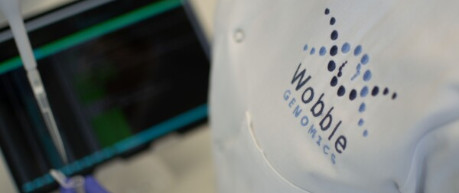Thursday 24th October 2024, 9:00am
Wobble Genomics, a healthcare and biotechnology company at the forefront of long-read RNA sequencing, presented data demonstrating that its technology can detect rare full-length RNA transcript variants not picked up by other methods. Wobble’s technology utilised full-length RNA transcripts as biomarkers to achieve early-stage breast cancer detection with 80% sensitivity at 95% specificity.

The findings, presented yesterday at the Early Detection of Cancer Conference (EDCC) in San Francisco, are based on a prospective clinical study of 101 breast cancer patients and an age-matched control cohort of 101 individuals without breast cancer. By building comprehensive transcriptome profiles using full-length RNA sequencing from liquid biopsies, Wobble Genomics demonstrated the ability to separate cancer-associated RNA sequences from controls, finding new unique transcripts and creating a strong predictive diagnostic for detecting early-stage breast cancer.
In addition, this technology shows the potential to provide biological and clinical insights that could enable better monitoring of disease progression, inform treatment decisions, understand treatment response and accelerate drug development for cancer.
“While still in early stages, Wobble Genomics’ technology has the potential to exceed current methods of sequencing-based liquid biopsy diagnostics for breast cancer by providing information on tumour type, cancer activity, and monitoring response to treatment. I am looking forward to the future development of the technology, and for what it could mean for patients and the fight against cancer.”
Dr. Mike Dixon OBE, Professor of Surgery, Consultant Surgeon and Wobble Genomics collaboratorWithin the study, Wobble Genomics identified on average over 600,000 RNA transcripts per patient, with the majority of these transcripts being seen for the first time. As a comparison, the public annotation databases that curate global knowledge of genes and transcripts for humans contain approximately 250,000 transcripts in total.
Wobble Genomics utilised these novel RNA transcripts to achieve their high accuracy for early-stage breast cancer diagnostics. The vast number of new novel transcripts have the potential to offer a brand-new insight into human biology and medicine. Wobble Genomics is currently building a database with these novel transcripts, to better characterise human disease and identify biomarkers with value in a wide range of medical applications.
“In the past, DNA has been central to the development of molecular diagnostic tools that have enabled the introduction of precision medicine in recent years. However, DNA has a limited scope when it comes to its utility as a diagnostic option and, as such, it can be hard to unveil the complex disease biology underlying cancers. Wobble Genomics’ technology now enables us to directly measure cellular functional states using full-length RNAs. Their diagnostic platform has achieved exceptionally high accuracy in one of the most challenging cancers to diagnose at early stages via liquid biopsy. The platform also unveils the genetic heterogeneity observed in cancer, making further strides towards early detection, progression monitoring, and treatment response.”
Dr. Han-Yu Chuang, Consulting Chief Technology OfficerWobble Genomics was established in 2021 by Dr Richard Kuo and was spun out of the Roslin institute, University of Edinburgh. It has since been operating in 'stealth mode', working to establish itself in long-read RNA sequencing. Long-read sequencing, hailed as Nature’s 2022 Method of the Year, is still a relatively new technology. Currently, the main challenge facing the blood test diagnostics market is the ability to see low abundance genes and associated RNA signals, which can act as markers of disease. Wobble Genomics has developed innovative solutions with its technology to address this challenge.
“We are in an exciting new era of healthcare, with the advent of new cancer therapies that have the potential to save millions of lives, and to fulfil this new potential we need the tools to see cancer in a more informative way. At Wobble Genomics, we are proud to share our novel methodology for detecting RNA that were previously invisible, because when you see more, you can do more. We are excited to now sharpen our focus on working with the scientific community, with a view to accelerating advancements in oncology and ultimately, patient care.”
Article source: Wobble Genomics